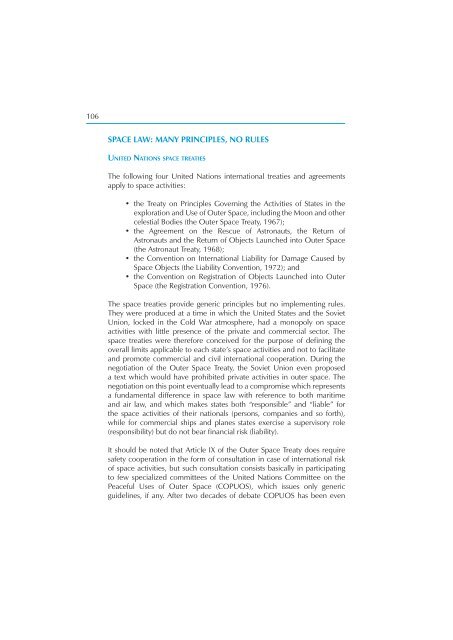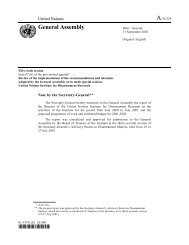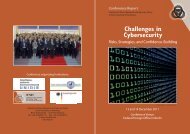Security in Space The Next Generation - UNIDIR
Security in Space The Next Generation - UNIDIR
Security in Space The Next Generation - UNIDIR
Create successful ePaper yourself
Turn your PDF publications into a flip-book with our unique Google optimized e-Paper software.
106<br />
SPACE LAW: MANY PRINCIPLES, NO RULES<br />
UNITED NATIONS SPACE TREATIES<br />
<strong>The</strong> follow<strong>in</strong>g four United Nations <strong>in</strong>ternational treaties and agreements<br />
apply to space activities:<br />
the Treaty on Pr<strong>in</strong>ciples Govern<strong>in</strong>g the Activities of States <strong>in</strong> the<br />
exploration and Use of Outer <strong>Space</strong>, <strong>in</strong>clud<strong>in</strong>g the Moon and other<br />
celestial Bodies (the Outer <strong>Space</strong> Treaty, 1967);<br />
the Agreement on the Rescue of Astronauts, the Return of<br />
Astronauts and the Return of Objects Launched <strong>in</strong>to Outer <strong>Space</strong><br />
(the Astronaut Treaty, 1968);<br />
the Convention on International Liability for Damage Caused by<br />
<strong>Space</strong> Objects (the Liability Convention, 1972); and<br />
the Convention on Registration of Objects Launched <strong>in</strong>to Outer<br />
<strong>Space</strong> (the Registration Convention, 1976).<br />
<strong>The</strong> space treaties provide generic pr<strong>in</strong>ciples but no implement<strong>in</strong>g rules.<br />
<strong>The</strong>y were produced at a time <strong>in</strong> which the United States and the Soviet<br />
Union, locked <strong>in</strong> the Cold War atmosphere, had a monopoly on space<br />
activities with little presence of the private and commercial sector. <strong>The</strong><br />
space treaties were therefore conceived for the purpose of defi n<strong>in</strong>g the<br />
overall limits applicable to each state’s space activities and not to facilitate<br />
and promote commercial and civil <strong>in</strong>ternational cooperation. Dur<strong>in</strong>g the<br />
negotiation of the Outer <strong>Space</strong> Treaty, the Soviet Union even proposed<br />
a text which would have prohibited private activities <strong>in</strong> outer space. <strong>The</strong><br />
negotiation on this po<strong>in</strong>t eventually lead to a compromise which represents<br />
a fundamental difference <strong>in</strong> space law with reference to both maritime<br />
and air law, and which makes states both “responsible” and “liable” for<br />
the space activities of their nationals (persons, companies and so forth),<br />
while for commercial ships and planes states exercise a supervisory role<br />
(responsibility) but do not bear fi nancial risk (liability).<br />
It should be noted that Article IX of the Outer <strong>Space</strong> Treaty does require<br />
safety cooperation <strong>in</strong> the form of consultation <strong>in</strong> case of <strong>in</strong>ternational risk<br />
of space activities, but such consultation consists basically <strong>in</strong> participat<strong>in</strong>g<br />
to few specialized committees of the United Nations Committee on the<br />
Peaceful Uses of Outer <strong>Space</strong> (COPUOS), which issues only generic<br />
guidel<strong>in</strong>es, if any. After two decades of debate COPUOS has been even








